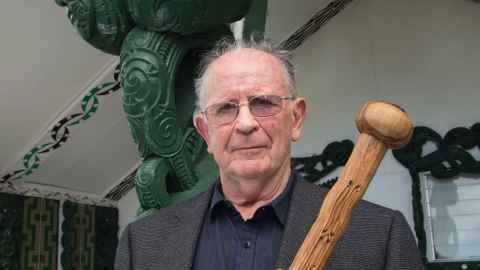Obituary: Sir Vincent O'Sullivan, 28 September 1937 ‒ 28 April 2024
4 June 2024
Emeritus Professor Mac Jackson pays tribute to his old friend, poet Vincent O’Sullivan.

Vince and I arrived as students at Auckland University College, as it then was, in the same year, 1956. We both majored in English, entered the MA class, had short stints as temporary junior lecturers, and went on to do postgraduate work at Oxford, where we became close friends.
It had probably been in 1958 that Jonathan Hunt, who was editor of Craccum, asked me to review a university literary magazine and I singled out a poem by Vincent O’Sullivan (whom at that stage I didn’t know) for special praise. This turned out to be one of my better calls.
While an Auckland student, Vince gave another hint of his later literary achievements, with a Capping Revue script sparkling with puns on cigarette brand names. This was hardly Shuriken, but I can still recall some of the one-liners.
Vince’s Oxford thesis was on two representative figures of the fin de siècle, the poet Ernest Dowson and Oscar Wilde. Rumour that the young New Zealander was working on Wilde gained him occasional unwanted attentions, but his interest in Wilde was, of course, in his brilliant wit and his range of literary and critical talents. Vince’s supervisor was J.I.M. Stewart, a fine Scottish novelist and scholar-critic, who published crime fiction under the pen name Michael Innes.
He commented on Vince’s finished thesis, that it “read like a good detective story”. I doubt that Vince told that to anybody else.
He was a vital presence in so many lives – certainly in mine for 65 years.
During our Oxford years, the Professor of Poetry was Robert Graves, whose poems we both admired. I remember Vince – who was always a fund of anecdotes – recounting, with amusement at Graves’s aplomb, the tale of his knocking at the door of some university dignitary and announcing: “It’s the poet Graves here”.
I always knew Vince would be ‘the poet O’Sullivan’. But it was a while before he also became a splendid writer of fiction. When his first short stories appeared, Frank Sargeson wrote to congratulate him. Vince wouldn’t have noised that abroad either, but how generously and effectively he himself later encouraged poets and prose writers whose abilities he recognised is obvious from the many memorial tributes. Vince could soon do so as O’Sullivan the novelist, the playwright, the biographer, the librettist, while always remaining the Mansfield scholar.
His many awards included an honorary doctorate from the University of Auckland and culminated in the knighthood which, despite initial reluctance, he eventually accepted for the sake of family and in homage to his migrant Irish forebears.
When Vince was gathering material for his biography of Ralph Hotere, he remarked to me that everybody tended to claim Ralph for themselves. It is natural that we should do this when remembering Vince. He was a vital presence in so many lives – certainly in mine for 65 years.
My admiration for his writing increased with each new book. Vince’s range, even within his last collection of short fiction, Mary’s Boy, Jean-Jacques and other stories (2022), is exceptional.
Who else could have had the imaginative daring to make the crew of a nineteenth-century vessel sailing in the Arctic discover Frankenstein’s creature clinging to an iceberg, and take him on board; and in the same volume imagine with such empathy and so movingly the lives of ‘The Walkers’, special needs lad Eric and his father Tommo, seen walking the streets of Dunedin.
But Vince could also do so much in a few lines of verse. ‘No harm in hoping’, the last poem in Lucky Table (2001), stands for me as his memorial.
No harm in hoping
At the end of the story I want you
to say, ‘I’ve forgotten the plot entirely.
It’s no use asking which character was which,
What name she used, what his job was.
Or where the bridge crossed the canal.’
At the end of the story I want you
to remember only the important things
that walk between the congregations of print
like a bride you’ve read of between the torches
of the story you thought you read.
This article first appeared in the June 2024 edition of UniNews.